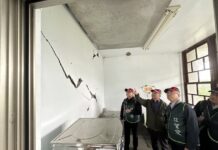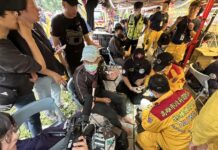3146 Edition
June 11-17, 2012
Headline News
Christians speak out and make a stand as environmental concerns surge in Taiwan
Reported by Chiou Kuo-rong, Simon Lin
Written by Lydia Ma
As the world celebrated World Oceans Day on June 8, a survey by Taiwan Environmental Information Center (TEIC) revealed that a lot of elementary school children and the general public in Taiwan lack adequate understanding of the ocean and marine ecology. Furthermore, about 70% of the population have yet to learn that Dongsha Atoll National Park is the only oceanic national park in Taiwan.
To help Taiwanese catch up on information they may have missed while in school, Taiwan Environmental Information collaborated with Standard Chartered Bank on a project consisting of a hand drawn map of Taiwan featuring important coastal ecosystems along Taiwan’s 1600 km long coast line. This is the first time such a map has ever been produced and it will serve as a useful teaching resource for environmental classes in the future.
Chen Ruei-bin, General Secretary of TEIC and a member of Taiwan’s Baptist Church, noted that about 95% of Taiwanese like to go to the sea to have fun or to relax, but very few of these people have an in-depth understanding of the ocean. He attributed this trend as the result of regulations during the Martial Law era, when access to the sea was not as free as today. However, Chen also underscored that this trend is the reason why greater efforts must be made to educate the general public about oceanic ecosystems.
Similarly, Christian organizations Cosmic Light Holistic Care and I-Link Community Services Association Taiwan co-hosted a forum on June 9 to raise awareness on the sinking of the seabed, the rise of sea levels, and the eventual flooding and submergence of many cities and villages in Taiwan. The forum discussed at length the present situation in Dongshih Township, and urged Christians to help by getting involved. According to reports, there are plans to create a recreational lake in Dongshih that would also solve flooding problems while creating a new tourist attraction site and boost the local economy.
National Taiwan Normal University’s Graduate Institute of Social Work professor, Dr. Kate Yeoung-tsyr Wang, remarked that she felt God calling her to get involved with groups concerned about Dongshih during a prayer session. She said that the area is known for its oyster industry, but laborers who pick oysters only earn about NT$800 every day for 10 hours of work. The reason why they are paid so little is because of exploitation by wholesale agents.
As result, Wang discovered that the gap between the rich and the poor in Dongshih continued to widen. She also noted that wealthy people could afford a better and higher foundations for their houses and thus protect themselves from floods, while the poor people learned to get by with parts of their houses submerged in water until dry and sunny seasons came. Upon conducting a survey of local residents, Wang reported that the fear of floods was the second highest source of psychological pressure. She underscored that local residents really need people to reach out and help them in their plight and urged Christians to lend a helping hand.
In southern Taiwan , two Paiwan indigenous reservations in Chunrih Township situated in Pingtung County have come together to create a self-help association to express their dissatisfaction and opposition to the Shihwun (or Seveng in Paiwan language) Reservoir. These indigenous residents are upset that parts of their village or ancestral lands have been designated by the Water Resource Agency as land that will be cleared to make way for a new reservoir without any regard to their safety and their livelihoods.
“The water level of this reservoir will be much higher than the land on which the reservation is built. We will have to relocate the whole community,” said Seveng Presbyterian Church pastor, Rev. laugia, adding that indigenous residents are ready to fight for their homes to the very end.
The two indigenous reservations opposing this project are Kuabale Reservation and Seveng Reservation. Rev. laugia said that the reservoir would not only force Seveng residents to relocate, it would also destroy several cultural sites and ancestral graves because of inundation, and more than 70 families would lose their farmland as they wouldn’t be able to cultivate anymore. As for Kuabale residents, the softening of the soil in recent years has made nearby hills dangerous and prone to landslides. Development projects in the area were banned in the aftermath of Typhoon Morakot, but even that regulation has not prevented the Water Resource Agency from wanting to build a reservoir. In the event of a landslide, the most vulnerable and affected area would be Kuabale.
Besides residents from Kuabale and Seveng, farmers living in Fangliau Township also oppose the construction of this reservoir because they depend on water flowing down from Seveng. A reservoir in Seveng would stop the flow of water and affect the irrigation of the soil downstream, which would ruin their farms and their livelihoods. As result, these farmers joined Kuabale and Seveng residents in protesting against this project.
Rev. laugia said that indigenous residents sincerely wish to discuss this matter with the Water Resource Agency so as to reach an agreement. However, the latter has been unwilling to send delegates to discuss this matter and no one from the agency came to address protesters during a recent rally attended by more than 200 residents. Rev. laugia added that the agency has been advertising the peripheral advantages of this project without addressing the welfare of indigenous peoples. For this reason, indigenous residents are fed up, can no longer bear to hear such misguided advertisements, and only want to protect their homes.
Photo by Chiou Kuo-rong






